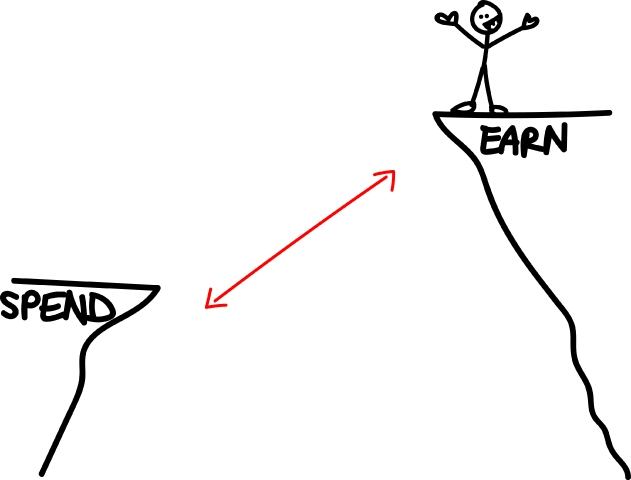
I live in a two-bedroom condo. It’s furnished with a used couch and used coffee table.
My shoe rack is made from old cardboard boxes glued together.
Almost everything else in my home is from Craigslist, Amazon and Overstock. I consider IKEA to be a splurge.
My favorite hobbies are hiking and camping (free and cheap).
My friend Amanda cuts my hair. (In fairness, she’s a hairstylist.)
I can’t remember the last time I got a manicure or pedicure.
When I travel overseas, I fly with airline miles and visit countries where the exchange rate works in my favor.
The cheapest car I’ve ever purchased cost $400. I drove it for a year and a half, then sold it for $200.
The newest car I’ve ever purchased was 4 years old.
I bought my laptop and phone used (refurbished).
I lived with roommates until I was 31.
And I never need to work a job I dislike again.
This is what financial independence looks like.
(I originally published this on Instagram, where you can find me microblogging weekly.)
One of the pitfalls of society (gee, that’s an uplifting intro) is our massive lack of financial education.
We’re taught the Pythagorean theorem, but not how to balance a checkbook. Or what “APR” means. Or the difference between marginal vs. effective tax rates.
Most people don’t understand how money works.
Instead, we’re socialized with myths and misconceptions about money:
- Buying is always better than renting;
- Buying a new car with a zero interest rate is smart;
- The stock market is risky so stay in cash;
- Bitcoin is an ‘investment’;
- Don’t worry about retirement if you’re young;
- Repay your student loans before you start a retirement fund;
- Holding debt will improve your credit score;
- You can’t invest unless you’re an expert;
- Your home is an ‘investment.’
To name a few.
One of my goals with this website is to demonstrate how to make math-driven, spreadsheet-based decisions about money. Many of these misconceptions collapse under the weight of careful scrutiny.
Each one merits its own article, but that’s another topic for another today. Today, I’d like to chat about broader myths and misconceptions — the kind that affect our mindset.
Here are eight financial myths, in no particular order: (These come from Podcast Episode #87.)
Myth #1:
Money is scarce.
We’re taught that money is scarce, so you must clutch it with tight fists. Money is hard to earn and easy to squander.
But is this true? Or is this a self-fulfilling prophecy? If we believe that money is scarce, do we close ourselves off from receiving it?
When I say “self-fulfilling prophecy,” I don’t mean to sound all “woo-woo, law of attraction, crystals and unicorns.” If you want to attract money into your life, you need more than mere positive thinking. You need to double down. Write a plan. Start a side business. Launch a website. Pitch people. Buy an investment property. That’s how you attract money: You hustle.
But you’re not likely to take that type of radical action if, deep down, you believe money is in short supply.
Scarcity is a de-motivator.
If we internalize the idea that money is scarce, then it becomes rational to obsess over saving rather than earning. If money, like time, is a fixed quantity, then optimization comes from cutting rather than growing.
And that’s a recipe for shortchanging yourself.
Now, to be clear, I’m a natural-born saver and I encourage a minimalist(-ish) lifestyle, given that many people seem to have confused “needs” with “wants.”
But extreme saving is a problem. Clipping coupons, stockpiling toilet paper, and hoarding a garage brimming with useless plastic junk because it was “such a good deal” at a yard sale — that’s not frugality. That’s a variant of excess.
You cheat yourself when you overlook dollars to pick up dimes. You fall short of your potential when penny-pinching becomes more important than creative production.
Frugality is tempting: there’s an immediate payoff, instant gratification. There’s no fear of failure. And it focuses on consumerism (buying for less), which is more comfortable and familiar than creation (converting an idea into reality).
But it must be held in moderation. Those “53 ways to save money!” listicles reflect a deep-seated belief that shopping the post-holiday clearance aisle for discounted wrapping paper is a better use of your time than literally anything else you could be doing.
Myth #2:
You’ve heard the expression: “It’s not what you earn, it’s what you spend.”
Meh.
This is half-true. What you spend matters, but what you earn also matters. It’s both. It’s what you earn and what you spend.
Your job is to increase the gap between earning and spending. There are two ways to grow this gap: earn more, spend less, or a combination of both.

Imagine that you earn $60,000 per year. You land a promotion, which increases your salary to $70,000. You start a side hustle, which might bring in $15,000 per year. You invest in a rental duplex, which nets $8,000 per year.
You’re now earning an extra $33,000 per year — more than half your former salary, and far more than you could have saved through belt-tightening alone.
What you earn matters.
Of course, if you blow this extra $33,000 on fancy cars and cocktails, then DUH, you’ll reap what you sow. But if you invest this money, you’ll launch yourself on a faster trajectory than the people who focus on spending alone.
Myth #3:
Money doesn’t matter.
Uhh, money does matter. If it didn’t, why wake up to an alarm clock? Why climb out of a cozy warm bed, scrape ice off your windshield, and sit in bumper-to-bumper traffic? Why spend the day drinking lukewarm coffee under fluorescent lighting, while you answer emails and shuffle paper and deal with a passive-aggressive supervisor?
Why would you endure this with your short, beautiful life … and then turn around and claim that money doesn’t matter?!
This makes zero sense.
When people say that money doesn’t matter, oftentimes they mean buying unnecessary crap doesn’t matter. Lamborghinis don’t matter. Gucci handbags don’t matter. That’s true. That’s also irrelevant.
Money is distinct from the physical goods it purchases.
A surplus of money buys the opportunity to engage in work that fuels you. Money allows you to wake up to an alarm because you’re going to spend the day creating art, or writing, or volunteering, or building a business, or taking care of your children.
Time is scarce, and value derives from scarcity. Time, therefore, is more valuable than money.
Until you reach financial independence, you’ll trade time for money. This means you’re exchanging something rare and non-replicable for something of lesser value. That’s a losing trade.
Money is the tool that allows you to stop making this lopsided trade.
Myth #4:
Money is the root of all evil.
The actual quote is “for the love of money is the root of all evil.”
Money itself isn’t the root of all evil. Loving money — i.e., greed — can lead to evil decisions, but money itself is an inanimate object. It’s neither good nor evil.
Money is a tool, like a hammer. You can use a hammer to build a house or torture a kitten. Regardless of how you use it, the hammer itself is merely an object. The person wielding the hammer imbues it with meaning.
Money amplifies you. If you were already a jerk, and then you get a bunch of money, now you’re just a jerk with money.
But if you’re a kind, responsible person, your money management will reflect that.
We should neither blame nor praise money. Money is nothing more than a tool. It is our job to learn how to use that tool in the best way that we can.
Myth #5:
Money causes conflict. Mo’ money, mo’ problems.
As a child, if you saw your parents or siblings arguing about money, you may have developed the unconscious idea that money creates conflict.
In reality, your spending is a reflection of your priorities. An argument about money, fundamentally, is an argument about values.
Often, a person’s stated values — the values they think they hold — aren’t reflected in the way they spend.
Someone might say, “my health is important,” but regularly choose fast-food to save a few bucks.
Someone might say, “I want to travel, but I can’t afford it,” but they order from restaurants twice a week.
Someone might say, “I’m committed to growing my side business,” but they’re not willing to invest in it.
Money reflects what people actually care about. When people argue about money (including internal conflicts with themselves), they’re not actually arguing about money. They’re conflicted about priorities.
Myth #6:
It’s shameful or embarrassing to think about money.
Last year, I struck up a conversation with a random stranger on the sidewalk. He asked what I did for a living. I replied, “I’m a blogger and a podcaster.” He asked what topics I covered. “Money,” I replied.
And he said: “Oh, it’s a shame we have to think about money so much.”
Really? Why?
What’s wrong with thinking about money? People may argue that it’s more noble, more morally authoritative, to discuss ‘safe,’ ‘esteemed’ topics like social causes and art and music.
But — um, hello! — money allows you to spend your time focused on your passions and priorities. What could possibly be more critical than that?
Myth #7:
Rich people suck.
Oftentimes, people who would agree with the statement “you shouldn’t judge someone based on their socioeconomic class” will also, in the same breath, make flippant comments like “rich people don’t care,” “rich people are greedy,” or “rich people suck.”
I think some people hold a deeply limiting belief that they’ll never be rich. Nor will their friends or family. A reasonable coping mechanism, therefore, is to “otherize” the wealthy.
But as we’ve learned, the “us vs. them” mindset is never positive for society. This is a mindset we should eradicate, not encourage. If you agree that it’s wrong to judge others based on their socioeconomic class, remember that this works in every direction.
Myth #8:
Profits are made by taking advantage of others.
This myth comes from the idea that life is a zero-sum game. When one person wins, another loses. Any money you’ve earned is “made off the back” of someone else. Profits are evil; if you own a business and make profits, you are necessarily taking advantage of others.
Every time I publish a real estate income report, I get comments telling me that I shouldn’t profit from my tenants. They tell me that I should “be nice” and offer my properties at-cost; otherwise I’m taking advantage of my tenants.
I’ve thought about this carefully, and here is my conclusion:
If rental investors couldn’t make money, there would be no incentive to invest.
At a minimum, a rental property needs to earn the-same-or-slightly-better than an index fund in order to incentivize the investment. Otherwise, the rational decision is to stick with index funds.
If collecting returns from a rental property is ethically wrong, what’s the alternative? Should we eradicate renting as an institution? Should we live in a society in which nobody is a landlord — and therefore it’s impossible to move unless you have the funds to buy?
How would you move to a new city, if you couldn’t rent? Would we stay in hotels and Airbnbs? Or are these also taking advantage of people who need short-term housing?
You see the problem with this line of reasoning.
Here’s the reality:
My tenants need short-term housing in increments of one to two years. I build a team that purchases, renovates, repairs, maintains, and manages this housing.
The tenants get what they need – an enjoyable place to live – and I receive ongoing compensation for building and managing this business. That’s a win-win.
Mutual wins aren’t just a real estate issue.
My friend Amanda is a restaurant hostess who runs a side business as a licensed hairstylist. She cuts my hair, and I pay her. This is another win-win. She profits, and I get a haircut.
Should Amanda stop profiting off people who need haircuts?
Last week, I hired a graphic design company in Scotland to redesign the logo for this website. Are they unjustly profiting off people who need logo design?
Yesterday, I bought food from a grocery store. Did this store unjustly profit off people who want dinner?
Many people equate “profits” with greed. And that’s based on the premise that transactions are win-lose, rather than win-win. This is a limited view of the world.
Businesses are sustainable when both parties are happy. Profits that come from win-wins are encouraged.
The Bottom Line:
We hold many misconceptions around money. Some of these are tactical, such as misinformation about credit scores. Others are mindset-oriented, and influence how we feel about concepts like profits, scarcity/abundance, and the level of attention that we give to our finances.
Are you hanging onto any money myths that are holding you back?
